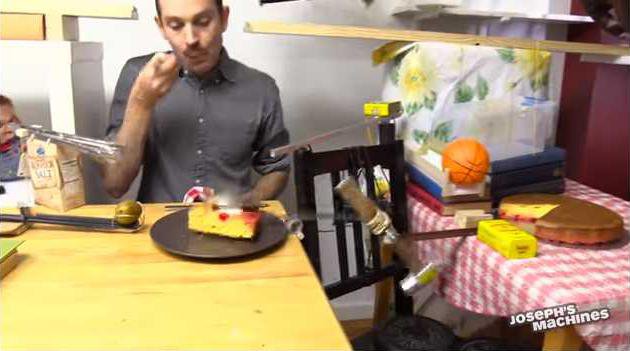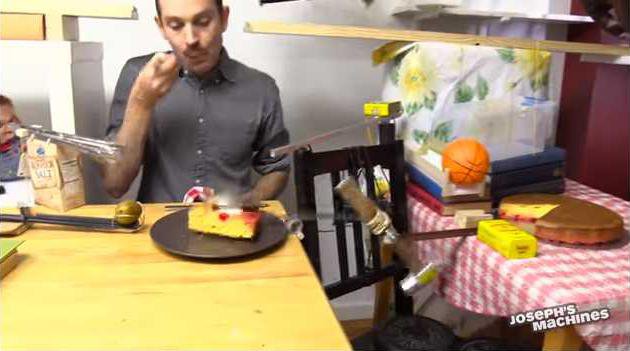THE KITCHEN Im sure Pink Floyd was only trying to make sure we all eat balanced meals when they yelled at us through lo-fi, How can you have any pudding if you dont eat your meat?
Its a complicated question that haunts parents and children to this day. (Side note: If you dont already know, pudding is a general name for desserts in the U.K.). Thats why Joseph of Josephs Machines attempts to explain, in the most complicated terms, that if you eat your balanced meal, yummy desserts will make their way to you.
OK, so thats not really his motive. But he did make a piece of pineapple upside-down cake the most complicated dessert in the world as the prize at the end of an intricate (if not elegant) Rube Goldberg machine. All he has to do is eat his nutritious meal to put the dessert-delivering machine in action.
This particular machine has something for everyone mayhem, destruction of valuable and invaluable property, babies, suspense, cleverness, comedy, and more than one happy ending (including getting his pudding because he ate his meat). Its basically like watching several genre-specific movies in less than three minutes. It even has its own ambiguous title The Cake Server which is a perfect title for a wedding-themed rom-com or last job and Im out heist movie.
Joseph has made several other machines of different types, but he says in the video description that this is by far his largest, and it took him three months to make.
If you want to see more of his slightly twisted machine genius, check out his YouTube channel, Josephs Machines.
Its a complicated question that haunts parents and children to this day. (Side note: If you dont already know, pudding is a general name for desserts in the U.K.). Thats why Joseph of Josephs Machines attempts to explain, in the most complicated terms, that if you eat your balanced meal, yummy desserts will make their way to you.
OK, so thats not really his motive. But he did make a piece of pineapple upside-down cake the most complicated dessert in the world as the prize at the end of an intricate (if not elegant) Rube Goldberg machine. All he has to do is eat his nutritious meal to put the dessert-delivering machine in action.
This particular machine has something for everyone mayhem, destruction of valuable and invaluable property, babies, suspense, cleverness, comedy, and more than one happy ending (including getting his pudding because he ate his meat). Its basically like watching several genre-specific movies in less than three minutes. It even has its own ambiguous title The Cake Server which is a perfect title for a wedding-themed rom-com or last job and Im out heist movie.
Joseph has made several other machines of different types, but he says in the video description that this is by far his largest, and it took him three months to make.
If you want to see more of his slightly twisted machine genius, check out his YouTube channel, Josephs Machines.








